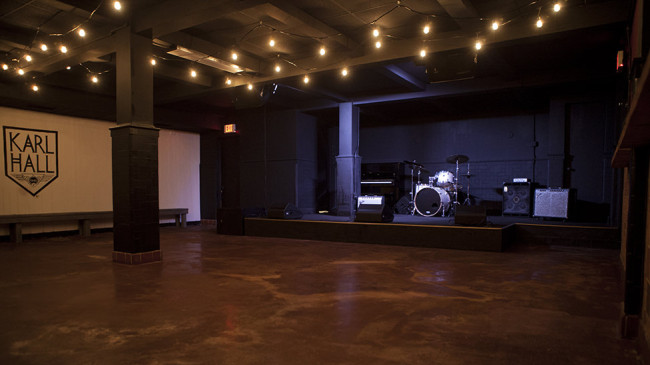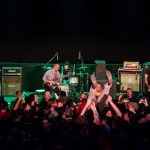Save Our Stages Act benefiting NEPA music venues included in COVID-19 relief bill

After stalling for months, Democrats and Republicans in Congress finally agreed on a $900 billion pandemic relief package on Sunday that incorporates the Save Our Stages Act, setting aside “$15 billion in dedicated funding for live venues, independent movie theaters, and cultural institutions,” according to Democratic House Speaker Nancy Pelosi and Senate Democratic Leader Chuck Schumer.
The National Independent Venue Association, which includes many independent music venues and festivals in Northeastern Pennsylvania, was formed in April at the beginning of the COVID-19 shutdown and has been fighting since then to get Save Our Stages legislation passed, noting that these “venues were the first to close and will be the last to reopen.”
The House of Representatives included Save Our Stages in the Heroes Act passed on Oct. 1, but the federal relief stalled in the Senate until last night and is expected to pass today with bipartisan support. It will then go to the desk of President Donald Trump to be signed into law.
“We’re thrilled that Congress has heard the call of shuttered independent venues across the country and provided us a crucial lifeline by including the Save Our Stages Act in the COVID-19 relief bill. We’re also incredibly grateful that this bill provides pandemic unemployment assistance, which will help the millions of people who lost their jobs through no fault of their own during this economic crisis. We urge swift passage of this legislation, which will assist those in the greatest need and ensure the music lives on for generations to come,” said Dayna Frank, owner and CEO of First Avenue Productions and board president of NIVA.
Among NIVA’s over 3,000 members in all 50 states and Washington, D.C., are the F.M. Kirby Center and Karl Hall in Wilkes-Barre, Stage West in Scranton and State College, the Sherman Theater in Stroudsburg, Mountain Sky in Jermyn, and ArtsQuest’s Musikfest Cafe and Levitt Pavilion at the SteelStacks in Bethlehem, as well as the annual Briggs Farm Blues Festival in Nescopeck and Musikfest in Bethlehem. From Pittsburgh to Allentown to Philadelphia to Lancaster, there are over 120 Pennsylvania members registered with the National Independent Venue Association, and many of them host theatre, stand-up comedy, and other events in addition to live music.
When polled, 90 percent of NIVA members said they could close forever if they do not receive federal funds after six months, and it is now long past that point. Last month, Boot & Saddle in Philadelphia permanently shuttered its doors, and as most live entertainment in Pennsylvania remains shut down until at least Jan. 4, there could be more closures to come.
Artists, promoters, production workers, and venue employees have been out of work for most of the year, and many of them have relied on COVID-19 unemployment benefits that were set to expire at the end of year. The relief package has extended those benefits and includes an extra $300 per week for 11 weeks. One-time $600 stimulus checks for taxpayers earning under $75,000 a year will also be distributed in 2021.
“We secured the #SaveOurStages Act for indie music venues, Broadway, comedy clubs, indie movie theaters, and more,” Schumer tweeted on Dec. 20.
“These are people’s jobs and livelihoods, and they need this help now. I won’t stop fighting for them.”
Both independent and corporately-owned NEPA venues have survived 2020 in various creative ways. Stage West produced a variety of drive-in concerts at the Circle Drive-In Theatre in Dickson City, which had never hosted live music before, as well as EDM shows in the parking lot of Montage Mountain in Scranton. The small Karl Hall in Wilkes-Barre joined up with the much-larger Mohegan Sun Arena at Casey Plaza in Wilkes-Barre Township to produce an all-day drive-in concert to benefit venues and nonprofits impacted by COVID-19, and the arena went on to host several more drive-in shows. The F.M. Kirby Center has been holding online auctions and hosting streaming shows with various national acts. Musikfest moved online this year, and the Sherman Theater has benefited from some community fundraisers. Mountain Sky used some of its 117 acres of land to farm corn and other produce to sell at local markets.
NIVA has helped the public send over one million emails to all 535 members of Congress through saveourstages.com and kept the conversation going on social media with #SaveOurStages. Prominent artists like Alice Cooper, Katy Perry, Slash, Jimmy Buffett, Mavis Staples, Quincy Jones, and Jim James of My Morning Jacket have publicly supported the Save Our Stages Act, and in October, YouTube Music and NIVA held a virtual Save Our Stages Festival, which featured 35 acts recording live from over 25 independent venues that raised $1,247,155 for U.S. venues.
Foo Fighters, The Roots, Miley Cyrus, Dave Matthews, Jason Mraz, Macklemore, Marshmello and Demi Lovato, The Lumineers, Rise Against, and more performed across three days, and NIVA has since announced the formation of the National Independent Venue Foundation, “a registered 501(c)(3) nonprofit that seeks to partner and fundraise through individual, corporate, and foundation donations to expand upon NIVA’s mission to preserve and nurture the ecosystem of independent live performance venues and promoters throughout the U.S. by also seeking to support a transparent, competitive marketplace serving a diverse and inclusive community of artists, fans, and industry workers.”
Hal Real, founder and CEO of World Cafe Live in Philadelphia, was named the president of this new foundation, and while this is another step in the right direction, the fight to save stages of all sizes is far from over. Cold weather has forced most outdoor shows to end until the spring, and indoor crowds must be limited and socially distanced to follow state and federal health regulations, so while COVID-19 vaccines are currently being distributed, it is still uncertain when venues will be safe enough to operate as they once did.
by Rich Howells
Rich is an award-winning journalist, longtime blogger, photographer, and podcast host. He is the founder and editor of NEPA Scene.



